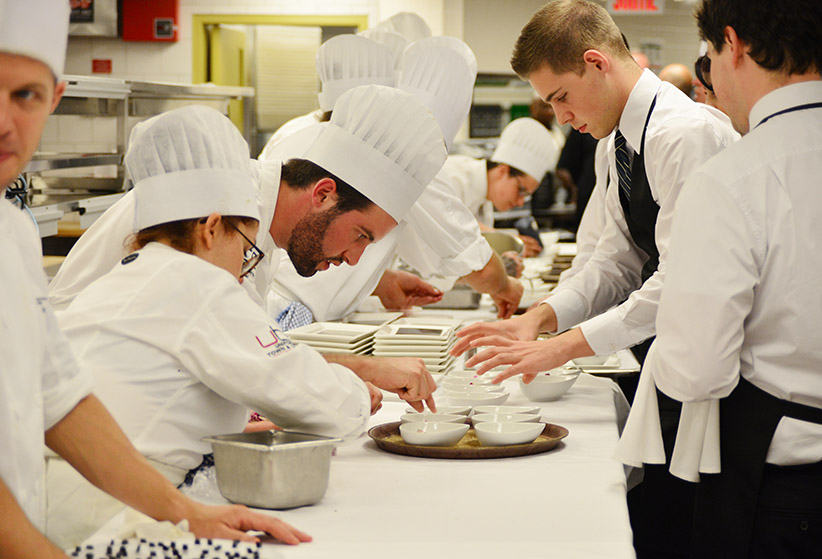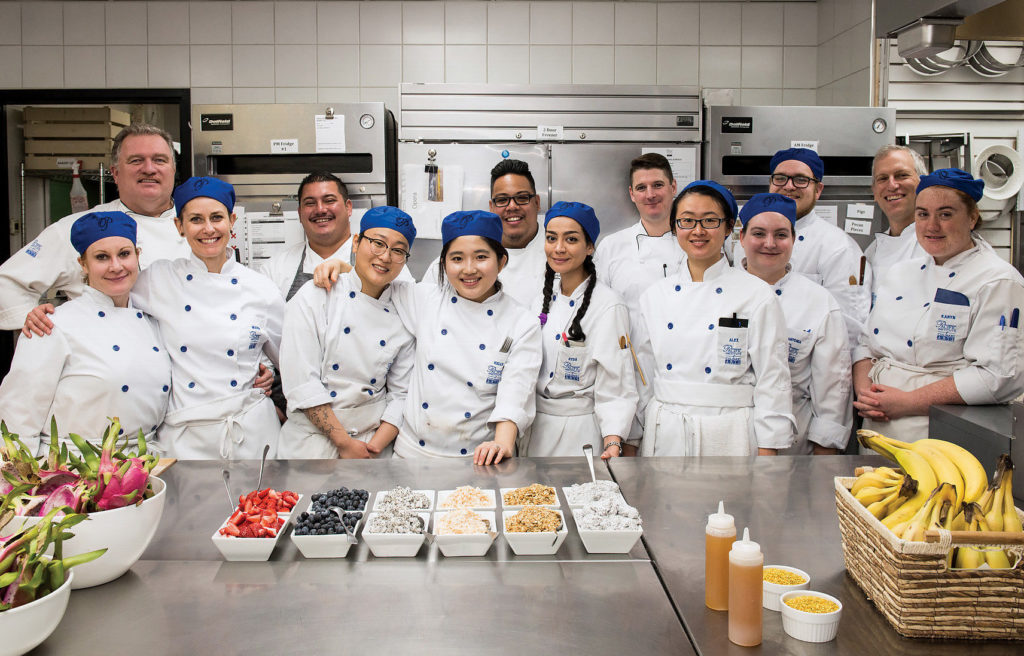05 Mar, 2019
How to Become a Professional Chef
A chef is a culinary professional who has reached the pinnacle of the cooking profession by mastering all facets of food acquisition, preparation, and presentation. A chef is ultimately in charge of the kitchen and each of its employees and holds the additional responsibility of meeting with vendors, developing the menu, managing the performance of personnel, and overseeing the training of cooks and other workers. To become a chef, most cooks start by learning the fundamentals of food preparation and then spend years honing their skills, observing the work of their peers, developing their own style, and carefully building their reputation in the kitchen. To learn more about the steps to become a chef, read our guide below and review additional resources from experts in the field.
Learn the Basics of Cooking & Food Preparation
Eating is more than a pastime for individuals who love to cook. But, the road to becoming a chef takes hard work and perseverance, especially for those just starting out. Head chefs at some of the most popular restaurants in the world didn’t start at the top. They had to pay their dues just like in most other career fields. But, those with talent and the drive to succeed can make it in this fast-paced world.
According to the US Bureau of Labor Statistics, the job outlook for chefs and head cooks is positive, with expected growth of nine percent between 2014 and 2024. The median annual salary for head chefs is about $42,000, but chefs with experience and a great reputation can make much more. Of course, location, education, and years of experience all play a part in determining salary, and chefs who start at the bottom must know that it may take some time to hit the $42,000 a year mark.

Attend Culinary School
Chefs oversee the food preparation at restaurants, or any place food is served. Head chefs supervise and manage kitchen staff and usually handle any food-related issues from owners or customers. The work can be hectic and kitchens can be hot, and chefs typically work whenever the employing establishment is open for business, which usually includes weekends and holidays.
Although a college degree is not necessary to enter this career field, many chefs will attend a community or technical college, four-year university, or culinary art school. Some chefs will travel abroad to learn from the masters in other countries; bringing back the tricks of the trade to prospective or current employers. Students attending culinary school will spend much of their time cooking, planning meals, learning food sanitation procedures, and purchasing food and supplies.
Most programs also include internships in kitchens outside of the school environment. Apprenticeship programs funded by professional culinary institutes or associations offer invaluable on-the-job training to aspiring chefs and generally lasts about two years. Internships and apprenticeships cover all aspects of cooking, from appetizers to desserts, and include training on kitchen equipment, knife skills, food safety, and sanitation procedures. It’s not uncommon to start out as a line cook or sous chef, increasing their knowledge and skills prior to becoming a head chef, and some cooks will spend years on the job in mentorship programs, where they work directly under the supervision of a head chef.
Although programs vary, coursework at a typical cooking/culinary school includes, culinary foundations and food safety, baking and pastry makings, international cooking, culinary entrepreneurship or catering, and event and menu planning. Of course, basic knife skills, learning which spices work best with which foods, wine paring, food preparation, and plating are also all things chefs must know prior to applying for work at a restaurant.
The American Culinary Federation accredits about 200 programs across the US. Graduation from an accredited institute can lead to greater pay and advancement. Although not required, obtaining certification can also show prospective employers a chef’s competence in the kitchen, which extends a better chance of being hired and the chance for higher pay.

Build Your Skills and Make Connections
Skills, Creativity, & Industry Connections Will Help You Rise in the Field
There are a number of skills that are necessary for all chefs, beyond cooking. Business skills and the ability to communicate are essential, as most chefs work with a team of kitchen staff. Creativity is also required to create interesting and innovative recipes that appeal to customers. Dexterity, stamina, a good sense of taste and smell, and time-management skills are also fundamental traits of all successful chefs.
Recently, the Food Network surveyed chefs and found that most worked between 60 and 80 hours per week, and nearly all holidays. Sixty-five percent said they made less than $75,000 per year. But, most admitted to loving their jobs. If you still plan to pursue a career as a chef, networking is imperative. Gaining an apprenticeship, mentorship, or simply starting out as a line cook after graduating from culinary school can all lead to rubbing elbows with professional chefs who can possibly recommend you for a job.
Final Thoughts
Becoming a chef isn’t quite the glamour that it’s chalked up to be on TV. It’s hard work that requires dedication and passion for the art of cooking. If you want to see if working toward becoming a chef is the right fit for you, get a job in a kitchen. Though it’s a hands-on field, there are a ton of learning opportunities that working in a kitchen can present. If that feels like the right fit for you, consider looking into culinary school or other education to gain a competitive edge.
Bottom line, being a chef isn’t easy. You can’t just “like” cooking — you’ve got to love it. A chef’s life is fast-paced, it can be hard on your body, sleep and social life, and it doesn’t get easier as you move up the ranks. Be sure you have the passion, drive and desire. Odds are you’re not going to be the next Gordon Ramsay, Rachel Ray, or even Remy. You’re a chef because you love to cook and you truly love the job.
